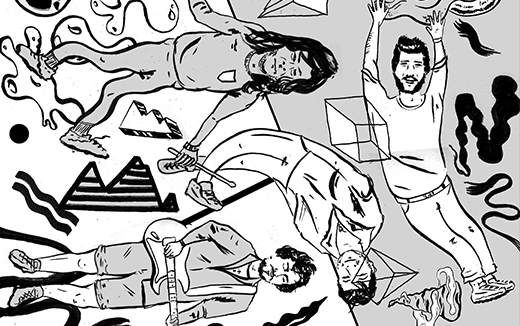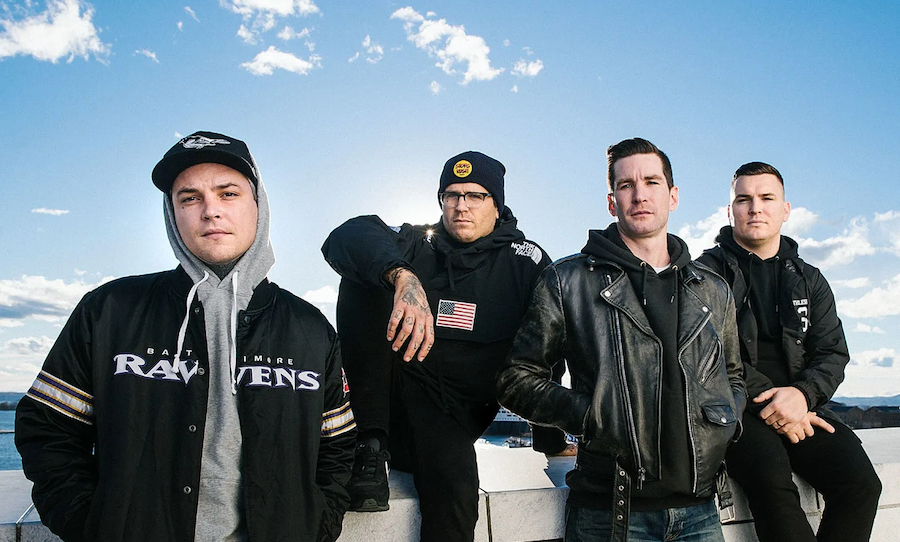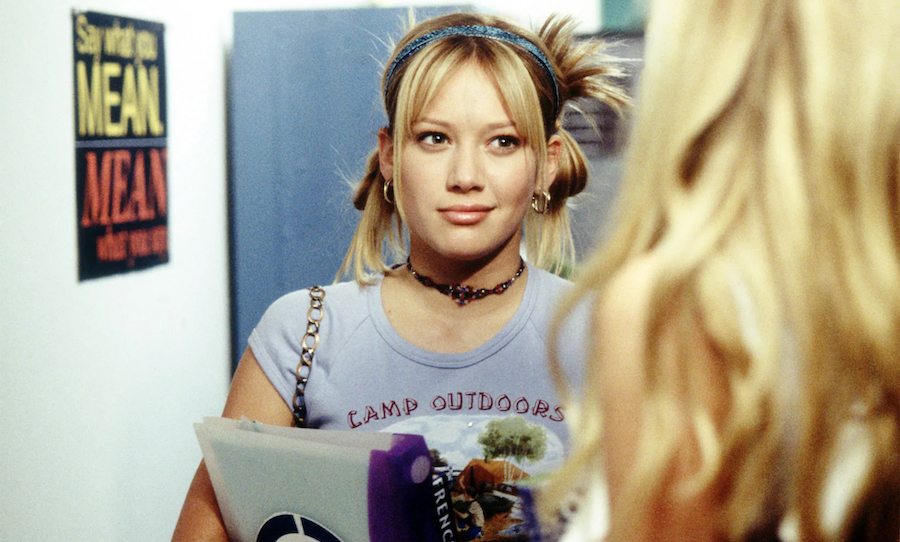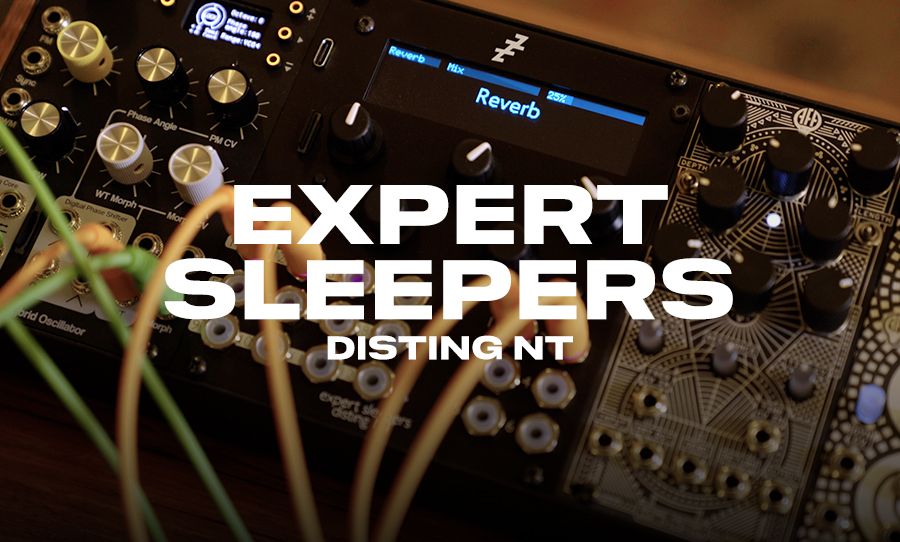With a pointed and poignant view of modern Australia, Bad//Dreems have released their debut album Dogs At Bay. Taking some time out of his day job as a reconstructive plastic surgeon, guitarist Alex Cameron chats the album, balancing two worlds and the shape of Australia today.
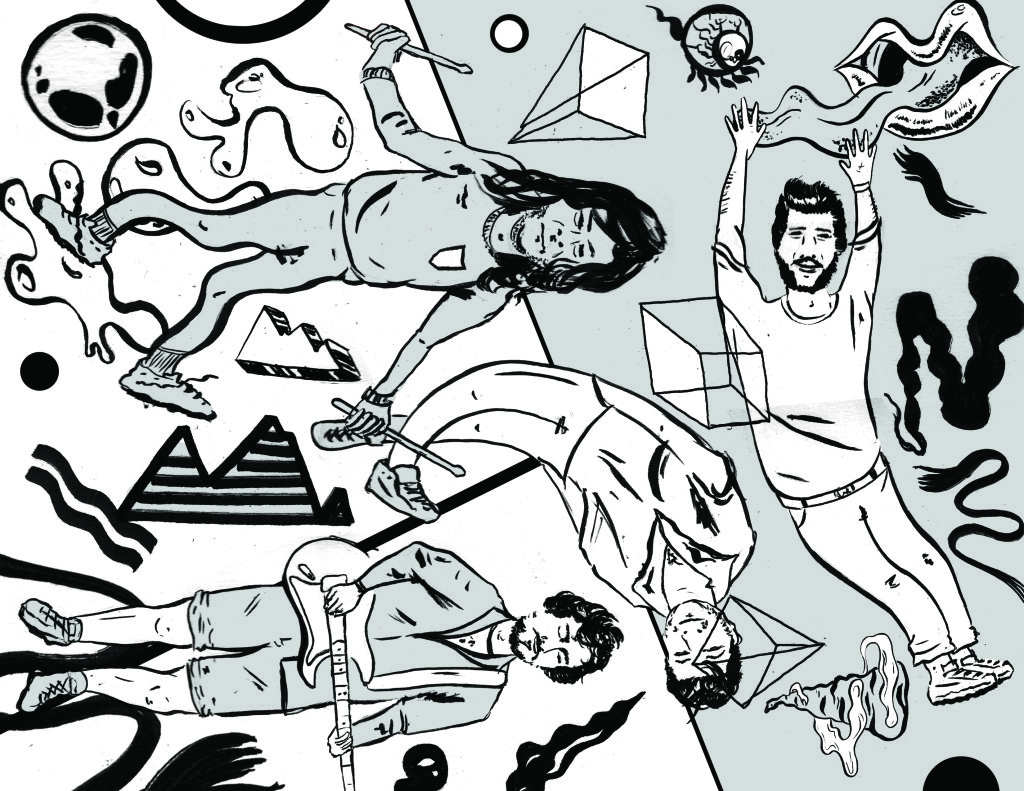
This woozy illustration of Bad//Dreems comes from Corey Adams, an illustrator from Pasadena who deals with all manner of surreal portraits.
HAPPY: Hey Alex, how’s things man?
ALEX: Nothing much, I’m just at work.
HAPPY: You work as a plastic surgeon right?
ALEX: Yeah I’m a plastic surgery registrar at the moment. I’m walking around the outside of the hospital, don’t really have much on this morning.
HAPPY: So what do you do exactly?
ALEX: Mainly reconstructive surgery. Hand injuries, burns, facial fractures, skin cancer. A lot of people have a misconception of what plastic surgery is with shows like Nip/Tuck and what not. So the word plastic comes from the Greek word Plasticos which means mould. So it’s basically using soft tissue or whatever’s left after injuries to try an reconstruct those things. And of course one aspect of that is the cosmetic surgery, but that doesn’t happen here at a public hospital. I don’t really indulge in that, nor do I really want to.
HAPPY: Wow. What got you into that in the first place?
ALEX: For many years I struggled the dichotomy of music and medicine, which is two things I’ve done in my adult life. I guess I’m more of a creative person than a scientist. The reason I was attracted to plastic surgery is that it’s creative in a sense. There’s never two problems that are the same. Basically you’re getting to use your creative part of your mind a bit more, and also it’s got an aesthetic aspect to it as well. Most of what we do is on the surface, so you can look at what you’ve accomplished at the end of the day.
It’s got an interesting history as well, it grew out of both of the World Wars because that’s when there was an increase in certain types of injuries. In World Was One there was all these shrapnel injuries for the first time and in World War Two there were burns, so that got me interested in it as well. It’s a good job but it’s a struggle (laughs). The struggle between this and music continues. I was hoping by this time in my life I’d have stop trying to combine the two things but it hasn’t worked out that way (laughs).
HAPPY: You could be a travelling surgeon on tour, every town you stop in you can help out for a day.
ALEX: Yeah that would be great, in the dream world! (laughs).
HAPPY: That’s really cool though, I don’t think we’ve spoken to anyone whose day job is a surgeon before.
ALEX: Yeah I guess it’s pretty unusual, it has been hard to combine the two. When Bad//Dreems first started I was doing a PhD. I had my own schedule so I had plenty of time to slack off (laughs). The last two years I’ve been back in the hospital which is often really long hours. At the start of last year we recruited a fifth member named Ali Wells who’s a really good guitarist and a really good producer. He had played two tours overseas which I couldn’t go on, and he plays the live sets as fifth member.
Everyone in the band has jobs as well, everyone except Ben our singer has been in bands before, and we’d all done the thing of “We’re going to be a massive, famous band. We’re gonna quit everything!” and we kind of knew the reality of it. So when we started we had no aspirations of that, just to try and write music we liked. Our approach has been everyone should keep their jobs because it makes everything a whole lot easier. You don’t have to worry about making money form music which is almost impossible in this day and age. Miles is a graphic designer, James is a consultant, so everyone else has the same thing going on. It gets difficult trying to combine the band with work but I find it kind of helps in a few ways.
HAPPY: Yeah it would take off so much pressure.
ALEX: It gives you perspective you know? Music and songwriting is very self-indulgent thing. It’s kind of grounding if you go back to work on Monday and you’re hungover and a shell of a man. You say to your workmates you played a gig on the weekend and they’ll ask “What sort of band are you in again? Do you play covers?“, and you’re like “Yep, we’re not really that special” (laughs).
HAPPY: Have you ever worked with someone who’s been a fan of the band?
ALEX: There’s not many people. I’ve certainly had a few patients who know the band, not very often. They’re pretty different worlds. I try to keep it secret at the hospital, the world of surgery is a pretty conservative world and people tend to have preconceptions as to what it is to be in a band. Well, maybe that’s my insecurity. And similarly in music, up until now I don’t really talk about it but I kept it pretty secret. Rock music is pretty different to being a doctor, so you don’t want people pre-judging you.
HAPPY: I think it’s really awesome since you help a lot of people man.
ALEX: Oh yeah there’s no doubt about it. It’s really satisfying, both of those things are a real privilege to do. Whenever people come to see us play I have to pinch myself, I can’t believe people I don’t even know come to watch us.
HAPPY: Did you ever end up finishing your PhD?
ALEX: Well I have, I just have to write it up which is now sort of hanging over my head (laughs).
HAPPY: I’m pretty sure Marilyn Manson has a PhD.
ALEX: There’s a lot musicians who do, Brian May has a PhD in astrophysics. The Radio Birdman founder works as a doctor now. The drummer in Hunters and Collectors was a doctor. There’s lots of examples of people who do that kind of thing.
HAPPY: Well this is a pretty weird segue when we’re talking about respected professions, but one of the best tracks off the album has to be Bogan Pride. It feels very real in regards to Australia today.
ALEX: (laughs). We kept thinking about changing the title of that song because it might give the wrong impression as to the subject matter and also with that SBS series called Bogan Pride. Really what that song’s about came from about four or five years ago. One of my friends was playing Summer Daze or Stereosonic, I can’t remember which one. I was just waiting around for him to play and I was surrounded by this sea of shirtless, roided up guys with Southern Cross tattoos on pingas and ice.
I had a real dystopian moment, I was just standing there and got really freaked out. What created this culture where these guys beef themselves up and hang around with their tops off, there’s this real homo-erotic thing but they’re still heaps aggressive and there was fighting. It was around the same time as the Cronulla Riots, wish was really disturbing and involved a similar type of person. I wouldn’t say anything like it was something particular like socio-economic class, it just felt like there was this generation that had lost their identity.
This misplaced nationalism and this homo-erotic thing. That song is basically a night through the eyes of one of these guys. It’s one of my favourite songs on the album because it’s really good to play live and Ben singing it is amazing, he really captures the drama of it.
HAPPY: I like that you use the word dystopian, that really runs throughout the album too.
ALEX: Yeah! That was five years ago before the band even started. Often times the places you play as a band, Fortitude Valley in Brisbane, Kings Cross in Sydney, so many times I’ve been there at 2am waiting with your band gear and seeing the chaos. With all the one punch thing that’s been happening I just ask “What the fuck has become of us?” And it’s a real dystopian thing, especially with things like ice, it actually sends people crazy and it is like they are possessed. You can also see they’re pretty normal guys, but it’s that scary phenomenon of going out and getting into that state of mind.
HAPPY: It’s almost like a lack of identity in a way.
ALEX: I think so. I think it’s sad that some people have been so-opted by Reclaim Australia and Southern Cross tattoos. All young people are impressionable, it’s sad to see that they can be drawn into that sort of thing which I think is very un-Australian and unproductive. You’re right, it is a lack of identity. That whole body building phenomenon of trying to beef yourself up to make yourself look almost surreal. I think we can all recognise that in themselves as well. I remember times when I was 20, me and my friends would go out and getting really badly beaten up by some guys. I put myself in a position where I was a dickhead. You can certainly empathise with the subject of that song.
HAPPY: You mention this idea of a lost nationalism and Australia, and listening to Dogs At Bay there is a very interesting thing you guys do where you capture a moment of Australia, or a new version of Australiana in a sense.
ALEX: That’s the thing, I’m glad you raised that. Some people who are doing that type of thing. Some people early on mentioned we were doing a piss take which is completely the opposite. The band has always sought to present ourselves the way we really are; unfiltered. We are from Adelaide. It’s an attempt on our part to reclaim that is authentically more Australian without taking the piss or without doing it as a caricature. There’s a lot of cultural cringe in Australia. If you do something like that people will be like “Oooohh they’re painting such a bad image of us!” or “Oh they’re just taking the piss“, that pisses me off.
If you go back to the 70s or 80s, Australian bands had a stronger sense of identity, there was a strong sense of what it is t be Australian. It didn’t have to be something that was dumbed down, yobo type of thing. That’s what we’re talking about with the Bogan Pride thing. It’s okay to be masculine, but you don’t have to be aggressive or chauvinistic. I always played football through my 20s, and I’d always feel embarrassed to admit that when I was with my old band. It’s okay to play football but be into writing and poetry. If you look back at bands like Midnight Oil or Radio Bridman they did have a masculine thing going but they were also literate and well read. I don’t think we’ve been able to show that yet but hopefully in the album that comes through.
HAPPY: It comes through, there’s a very surreal version of Australia which you do quite well.
ALEX: That’s the stuff I like, especially in cinema like The Road or Animal Kingdom, different people have picked up on that through the ages but it’s also pretty lost.
HAPPY: How would you define Australia Alex?
ALEX: Well for a start I hate any patriotism. I don’t really choose to necessarily identify in that way. The great thing about Australia is that it’s a great place with a diverse way of life where people have freedom to express their ideas which is unique in the world. To be more specific I do like the idea that in Australian arts and culture there’s a certain un-pretentiousness. People who have done great things in Australian music or art have striven to create art in a non-pretentious way. Which is a particularly Australian thing.
There’s no doubt we have a self-deprecating culture, which is quite different to America, and I like that. If you look at our songwriting; some of the subject matter that Don Walker and Paul Kelly deal with like the Vietnam War, divorce, it’s done in a way that a guy on the street to a literature professor can relate to. I think that’s a key thing to me that art can communicate the message to different people.
A great example of this and it’s a much maligned song, but take Khe Sanh for example. Because it’s so ubiquitous it’s frowned on by many people. But I reckon it’s better than Born in the USA, it’s an amazing song. It’s song by the guys arm in arm after a rugby match but you look at the lyrics and it’s a great story told with a lot of poignancy. That’s the essence of great Australian song. I just hope we try to rise above the stigma of portraying ourselves as anything less than that.
HAPPY: That’s a really interesting take on that man. Before you go we have to ask our last question. We always like to talk about what makes us happy, so Alex makes you happy?
ALEX: To tie it back to where we started, that many year struggle to combine these two parts of my life that are so different. I found the answer recently and it’s human contact. I really like being able to meet different people of all types and share a relationship with them in some way. Through music that happens, and it’s the same in medicine. Thats what makes me happy.
